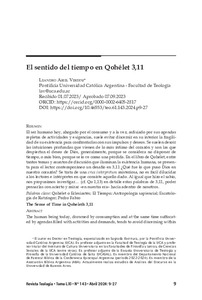Please use this identifier to cite or link to this item:
https://repositorio.uca.edu.ar/handle/123456789/17973| Título: | El sentido del tiempo en Qohélet 3,11 The sense of time in Qoheleth 3,11 |
Autor: | Verdini, Leandro Ariel | Palabras clave: | ECLESIASTES; ANTROPOLOGIA SAPIENCIAL; ESCATOLOGIA; Ratzinger, Joseph, Card., 1927-2022; Fabro, Pedro, 1506-1546 | Fecha de publicación: | 2024 | Editorial: | Pontificia Universidad Católica Argentina. Facultad de Teología | Cita: | Verdini, L. A. El sentido del tiempo en Qohélet 3,11 [en línea]. Teología. 2024, 61 (143). doi: 10.46553/teo.61.143.2024.p9-27. Disponible en: https://repositorio.uca.edu.ar/handle/123456789/17973 | Resumen: | Resumen:
El ser humano hoy, ahogado por el consumo y a la vez, asfixiado por sus agendas
repletas de actividades y exigencias, suele evitar discernir en su interior la fragilidad
de su existencia para confrontarlas con sus impulsos y deseos. Se suelen desoír
las intuiciones profundas que vienen de lo más íntimo del corazón y son las que
despiertan el deseo de Dios, generalmente, porque se considera no disponer de
tiempo, o más bien, porque se lo ve como una pérdida. En el libro de Qohélet, entre
tantos temas y asuntos de discusión que iluminan la existencia humana, se presenta
para el lector contemporáneo un desafío en 3,11 ¿Qué fue lo que puso Dios en
nuestro corazón? Se trata de una crux interpretum misteriosa, no es fácil dilucidar
a los lectores e intérpretes en que consiste aquello dado. Al igual que hizo el sabio,
nos propusimos investigar… (cf. Qo 1,13) en detalle estas palabras de 3,11, poder
pensarlas con acierto y mirar –en nuestra era– hacia adentro de nosotros. Abstract: The human being today, drowned by consumption and at the same time suffocated by agendas filled with activities and demands, tends to avoid discerning within himself the fragility of his existence and confronting them with his impulses and desires. Profound intuitions that come from the innermost part of the heart are often ignored, and it is these intuitions that awaken the desire for God, generally because of an apparent lack of time, or rather, because God is seen as a loss of time. In the book of Qoheleth, among the many themes and issues that illuminate human existence, a challenge is presented to the contemporary reader in 3:11: What did God place in the human heart? This is a mysterious crux interpretum, and it is not easy for readers to elucidate and interpret what the given thing was. Like the wise man, we set out to investigate (cf. Qo 1:13) in detail these words of 3:11 to revisit them and rethink the meaning of time. |
URI: | https://repositorio.uca.edu.ar/handle/123456789/17973 | ISSN: | 2683-7307 (online) 0328-1396 (impreso) |
Disciplina: | TEOLOGIA | DOI: | 10.46553/teo.61.143.2024.p9-27 | Derechos: | Acceso abierto | Fuente: | Teología. Tomo 61, No. 143, 2024 |
| Appears in Collections: | TEO - 2024 Tomo LXI nro. 143 |
Files in This Item:
| File | Description | Size | Format | |
|---|---|---|---|---|
| sentido-tiempo-Qohélet.pdf | 943,86 kB | Adobe PDF |  View/Open |
Page view(s)
25
checked on Apr 27, 2024
Download(s)
4
checked on Apr 27, 2024
Google ScholarTM
Check
Altmetric
Altmetric
This item is licensed under a Creative Commons License

